- Home
- J. T. Edson
Slip Gun
Slip Gun Read online
Issuing classic fiction from Yesterday and Today!
Folks said that Waxahachie Smith was finished when his enemies cut off both his trigger-fingers. But he came from a breed that did not accept defeat.
So he rode the range, ready to sell his fighting skills to the highest bidder. Nor was he ever out of employment when it was found he could still handle a gun with deadly speed.
The Colt carried by Smith looked like an ordinary Civilian Model Peacemaker. Except that it had no trigger and its short smooth hammer-spur was set low on the hammer. Internally, the trigger half of the bolt spring had been removed and the bolt-cam on the hammer reduced in length. The barrel was without rifling and the .45 bullets in the cylinder each held three balls.
By converting his Colt into a slip gun, Smith removed the need for a trigger-finger—and made it the fastest, most deadly weapon in the West.
WAXAHACHIE SMITH 2: SLIP GUN
By J. T. Edson
First published by Transworld Publishers in 1971
Copyright © 1971, 2015 by J. T. Edson
First Smashword Edition: September 2015
Names, characters and incidents in this book are fictional, and any resemblance to actual events, locales, organizations, or persons living or dead is purely coincidental.
All rights reserved. No part of this book may be reproduced or transmitted in any form or by any means, electronic or mechanical, including photocopying, recording or by any information or storage and retrieval system, without the written permission of the author, except where permitted by law.
Cover image © 2015 by Edward Martin
This is a Piccadilly Publishing Book
Series Editor: Ben Bridges
Text © Piccadilly Publishing
Published by Arrangement with the Author’s Agent.
For Terry Barratt, who drives his bus like the Kid rides Nigger
Chapter One – The Man Who Hated Rain
Going by the mass of dark clouds that spread across the sky from over the Antelope Hills, there might be a storm during the night. Even if the storm did not break, rain was sure to fall.
Waxahachie Smith hated rainy weather.
No matter how carefully Smith wrapped himself in his yellow oilskin ‘fish’, the water always found a way through to run down his neck. Worse than that, rain invariably made his trigger-fingers ache like hell. Which was mighty strange. His trigger-fingers must have long since rotted into nothing at the place where he had left them on the banks of the Rio Grande.
Give that crazy son-of-a-bitch Doc Gratz his full and rightful due, though. He had taken off the fingers as neat as a man could ask for, leaving sufficient skin to fold as pads over the places where they had been. Once the original pain of the removal had ceased, the stumps only troubled Smith when it rained. No fancy Eastern sawbones, working in a real hospital with all the latest surgical aids, could have done a better job.
It had almost been a pity to kill Doc Gratz.
In fact, some folks came right out and claimed that Smith had acted a mite ungrateful by killing him. Any qualified doctor ought to be within his rights to amputate injured fingers, toes, arms or legs, if doing so would save his patient’s life. While agreeing in principle, Smith had still put sawdust in the doctor’s beard and made wolf-bait of him.
At the time that the amputations had been carried out, Smith’s forefingers were in no way endangering his health or life. It was just that they could squeeze a Colt’s trigger too well for the Fuentes brothers’ peace of mind. So perhaps in one way the removal of his fingers could be called necessary. By causing it to be done, the brothers had hoped to save their lives. When all they had wanted was to take over the Texas border town of Flamingo. Smith and his Colt stood between them and the citizens. Everybody had known that sooner or later a showdown must come. Most had guessed which way it would go—against the Fuentes boys.
Rich and unscrupulous, the brothers might have had Smith bushwhacked; but killing a Texas Ranger—which he had been at the time—ranked as real bad medicine. So they had arranged for his food to be drugged one night. When he had regained consciousness, no forefingers remained to press a trigger. Yet when it rained, even though four years had passed since the operation, the missing digits still throbbed painfully.
So Smith hated rain, for it brought back memories he would rather forget.
Moving at an easy pace between Smith’s long legs as he posted to its trot, i the line-backed bayo-lobo gelding suddenly snorted and tossed its head. The man made no attempt to reach for a weapon, knowing that his mount’s actions did not warn of impending danger. Rather it had smelled its own kind ahead, their scent being carried over the next ridge by the same wind which spread the clouds.
Damn those clouds, with their threat of rain to bring torment to his non-existent fingers. Smith much preferred to work in the heat, dust and sweat of New Mexico or Arizona, where the average rainfall was low. If the request from Wyoming had been less urgent, or the advance payment smaller, he might have ignored it. Trouble was, like a fool he had accepted the money. His reputation would suffer if he failed to show up at Widow’s Creek and find out what the prospective employer had to offer.
Topping the ridge, Smith found that he had read the gelding’s signal correctly and there was no cause for alarm. Going by the cluster of whipsaw-plank buildings and the type of horses roaming aimlessly in the two large pole corrals, he had arrived at Gilpin’s stagecoach way station. Not a surprising discovery, nor a remarkable piece of cross-country navigation, seeing that he had been following the stagecoach trail from the time he had left the railroad at Laramie. Even before he nudged the gelding with his heels, he felt its pace quicken. Most likely it had scented grain and fresh hay, so knew that the end of its day’s work was in sight. So he guided it down the slope in the direction of the largest of the buildings.
Attending to his chores in the big combined stable and barn, old Dad Derham listened to the approaching horse with an attitude of anticipation. Always a student of his fellow men, he found that the somewhat menial post as hostler on a way station presented many opportunities to carry out his studies. Trouble being that each passing year saw a growing difficulty in forming accurate conclusions.
Time was a feller could tell, near enough, where a stranger hailed from and how he earned his living by his clothing and horse rigging. There had been few enough types of work then and most of them required specialized forms of dress. With the development and expansion of the cattle industry, cowhands tended to mingle styles in a mighty confusing manner. Then there was all the nesters, farmers and other settling folks coming from back East. The Good Lord alone knew how you pegged them down to their home range by what they wore.
The hooves stopped and leather creaked as weight was transferred from it to the ground. Stepping out of the empty stall he had just finished cleaning, Derham watched Smith lead the gelding through the big double doors. A grunt of satisfaction left the old timer. No mistaking this traveler’s place of origin. Most conservative and State-proud of all cowhands, a Texan invariably clung to the traditional fashions of his home range.
Not, Derham admitted, that the stranger was a cowhand. Which raised the question of what he might be.
Six foot two in height, lean and whang-leather tough looking as a steer fed on greasewood, the stranger wore a low-crowned, wide-brimmed, black J. B. Stetson hat as Texas as the Lone Star flag and ‘Remember the Alamo!’. Framed with neatly trimmed reddish-brown sideburns, the face sheltered by the hat was too rugged to be termed handsome. Tanned by long exposure to the sun, it had hard, grim lines and cold, watchful brown eyes. That was the face of a man who had suffered.
Under his buttoned-up wolf skin jacket, he wore a neatly knotted black string tie and grey flannel shirt. Coming from
beneath the jacket, which concealed whatever kind of gunbelt he might be wearing, Levi’s pants legs ended tucked into flat-heeled brown Wellington half-boots. ii Brown leather gloves covered his hands. Not the heavy gauntlets a man from the thorn-brush or cold-weather countries might wear, but lighter and more flexible. Gamblers often sported such gloves, to keep their hands soft for manipulating a deck of cards. The man was not a professional gambler. That tanned face had not been gained sitting all night at a card table and sleeping most of the day.
Maybe his mount would supply a clue.
By its conformation and size, the gelding would be better suited to long travelling than for the fast twirling, rapid footwork needed when working cattle. The wide two-ear bridle sported fancy-stitched leatherwork and the shanks of the curb bit took the form of plump, shapely feminine buttocks and legs. Although functional in design, the low-horned, double-girthed saddle had decorative carving on its fork, cantle, skirt, upper-flank skirt and fenders; rosaderos, iii the man would call the latter. The horn’s embossed top and the conchas which held the saddle-strings had the dull, solid glint of silver. On the left side of the saddle, pointing to the rear, the butt of a rifle showed from its boot. A bulky bedroll and yellow fish hung behind the cantle, but no coiled rope dangled from the fork. That kind of rig had been born in Texas, where a feller tied fast his rope and figured to hang on to anything he caught in its loop.
For all that, taken with the low-heeled footwear, the absence of a coiled rope on the saddle revealed that the stranger did not earn his living handling cattle.
Unfortunately, it did not help Derham place the stranger. Not entirely, anyway. By removing one possibility, it opened up another. The man walked with an economy of motion, silent and somehow seeming as graceful as a cat. There was an alert air about him, such as a man with many enemies always showed. Derham had never seen a gun fighter who did not. Seeing how he carried his gun might have furnished information, but the jacket prevented that. If he had enemies, he clearly did not expect to come across them around the way station. The buttons would have been unfastened, allowing uninterrupted access to his revolver, if he did.
By the time Derham had drawn that conclusion, the newcomer had almost reached him. Satisfying his curiosity about the other could only be done indirectly. So the old hostler elected to try a conventional opening to a conversation which might prove instructive.
‘Looks like—’ Derham began amiably.
‘Yeah,’ Smith interrupted. The last thing he wanted was to be reminded about the state of the weather. ‘Can I put up my horse in here?’
‘Use that empty stall,’ Derham answered stiffly. Age ought to carry certain privileges and command some respect. His tone showed that he resented the curt response. Tut him in, happen it suits you.’
Just how it happened, Derham could not say; but his last words had been addressed to the stranger’s back. Footsteps thudded outside, coming towards the barn. In a swift, silent movement, Smith had dropped the gelding’s reins and moved to face the open double doors. He stood so that he could look across the back of his horse at whoever entered. While looking, he began to peel off his gloves.
Being wise in such matters, Derham realized that the stranger’s actions had not been made as a further snub to him. They were merely the kind of precautions, like removing the gloves, that a gun fighter would take.
The young men strolled into the barn as if they owned it. Tall, bulky, they wore a hybrid mixture of town and range clothes, with Colts in low-hanging, tied-down holsters. Going by their swaggering attitudes, they considered themselves to be important citizens.
‘Hey, you. Hostler there,’ called the taller of the pair. ‘Try “hostling” some and get our hosses ready.’
‘Right sharp, too,’ the second new arrival went on, darting a challenging look Smith’s way. ‘We ain’t got all day.’
‘I’m tending to this gent,’ Derham objected.
‘He don’t mind waiting,’ declared the first speaker.
Smith’s cold, unfriendly eyes studied the pair and he assessed their quality like a rancher picking culls out of a herd.
They did not need much deep thought to classify them. No matter where one rode west of the Mississippi River, their kind could be found. Small-town loafers, would-be hard-cases, reared on tales of the old-time gun fighters and desperate to prove themselves in that same magic-handed category. Given the right conditions, they could be as dangerous as a stick-teased diamond back rattlesnake. Let them take an inch of liberty with you and they would grab for a mile. Wanting no trouble with them, Smith acted accordingly.
‘I do mind waiting,’ he stated, dropping the gloves into his jacket’s side pockets and stepping clear of the horse.
‘Yeah?’ grunted the taller hard case. ‘Well, he’ll get ’round to you when he’s through with us.’
‘’Cepting I don’t figure on waiting that long,’ Smith replied. ‘I’ll be needing grain, water and hay, mister.’
Watching the by-play, Derham felt uneasy and a mite disappointed. He had decided that the newcomer was a gun fighter and felt that the other was trying to spoil his summation. Instead of unbuttoning his jacket, the man had thrust his hands deep into its pockets. Glancing down, the old timer failed to detect any bulge that would hint that either pocket held a weapon. A man ought not to go up against Billy and Angus McCobb unless he was full ready to protect himself.
Taking in Smith’s posture, Billy McCobb flashed a knowing wink at his smaller, younger brother. Like Derham, Billy had looked carefully for signs of the stranger holding a gun concealed in one pocket. Billy felt sure there was not. Maybe that feller figured to look hard and ornery, but he missed impressing Billy by a good country mile. He needed teaching a lesson in Sweetwater County manners, which the brothers would be right pleasured to give him.
‘I’m saying the hostler sees to us first,’ Billy announced, advancing slightly ahead and to the right of Angus. ‘So you can just set back and wait on your betters, feller.’
‘Counting there was any such,’ Smith drawled, keeping his hands in his pockets. ‘I don’t see any of ’em around.’
‘Maybe you need something to open your eyes!’ Billy barked. ‘Like a crack ’tween ’em with a Colt’s barrel.’
‘You’d have to take it out afore you could do that,’ Smith pointed out.
‘Which’s easy enough done!’ Billy snapped, right hand dropping towards the holstered revolver as he strode into range for carrying out the threat.
Smith moved while Billy was declaring his intentions. Unlike the young hard case, who had telegraphed every move, the Texan gave no hint of what he meant to do. Leaving his hands where they were, Smith bent his right knee slightly. Up swung his left leg until its knee almost touched his chest and the foot was vertical to the ground. All in the same flashing motion, the foot stamped foot. The sole of Smith’s boot caught Billy on the chest and shoved hard. Taken by surprise, Billy staggered by his brother and landed on his rump with a solid thud.
From delivering the attack, Smith dropped the boot to the floor and used it as a pivot. Seeing the Texan apparently turning away, Angus lunged at him. If the younger brother believed that he was coming unexpectedly, he received rapid disillusionment. Balancing on his left leg, Smith swung his right around and stabbed it rearwards. It rammed with speed, accuracy and considerable force against Angus’ solar plexus. Letting out a croaking yelp of pain, Angus changed his advance into a retreat. Stumbling backwards, he tripped over Billy’s feet and fell on top of his brother. They subsided in a heap, to Derham’s undisguised delight.
Foul language billowed up from the McCobb boys as they rolled apart. Still seated on the hard-packed dirt floor, they directed their thoughts to wiping out the insult piled upon their family’s honor. With hands grabbing towards holsters, they turned angry eyes in search of their assailant. Doing so proved to be one of the few sensible acts in two otherwise mis-spent lives.
From heaving Angus after Billy, Smi
th brought his left leg down in the first of three strides which carried him to his horse’s near flank. His hands, stripped of their gloves, left the pockets. The right flashed forward to close around the wrist of the rifle’s butt. At the same moment, the left slapped the gelding on the rump. Snaking its head aside, to avoid stepping on the trailing reins, the horse walked into the empty stall. By doing so, it drew the boot away from the rifle. As soon as the barrel cleared leather, Smith spun on his heel in the brothers’ direction. Swinging the rifle around, he caught its fore grip in his left palm. He halted with his weapon dangling before him in both fists.
Admiration and satisfaction flickered on Derham’s seamed old features as he watched Smith hand the McCobb boys their needings. Every move had clearly been planned in advance and carried out with commendable precision. Putting his hands in his pockets had been smart, not foolish, lulling the brothers into a sense of false security. Derham had never seen a feller who could handle his feet in such a fancy, effective manner.
Glancing at the rifle, the hostler felt puzzled. At first sight it looked like an old Henry, with the barrel-long tubular magazine completely exposed. Its excellent condition suggested that it had been made long after Oliver Winchester stopped production on the Henry in favor of the more advanced models. Closer observation showed that it lacked the usual Winchester’s lever and had a fore grip, shortened to a piece of wood just large enough to be grasped by its user’s left hand. Derham might have noticed other things, but the McCobbs’ behavior attracted his attention.
‘Get the—!’ Billy was saying.
‘If you try to pull those guns,’ Smith put in and the rifle’s muzzle tilted into line between the brothers, ready to turn either way, ‘I’ll kill you both.’
There was no bombast in the words, only a plain statement of fact. With a cold, chilling sensation, Billy realized that he had gone in when the water ran high over the willows. A quick glimpse of his brother’s face told him that Angus shared his sentiments. Taking their hands away from the guns, they came slowly to their feet. Still the rifle remained pointing in their direction. The situation called for tact, not muscle.

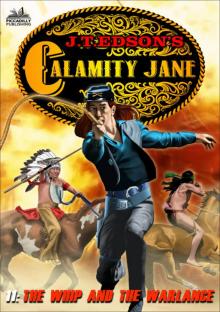 Calamity Jane 11
Calamity Jane 11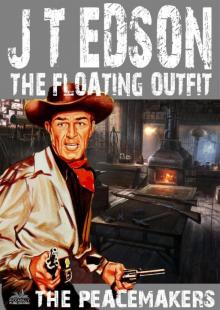 The Floating Outift 33
The Floating Outift 33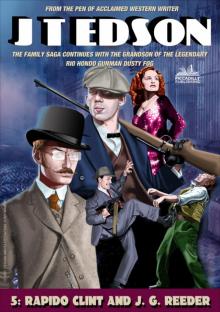 Cap Fog 5
Cap Fog 5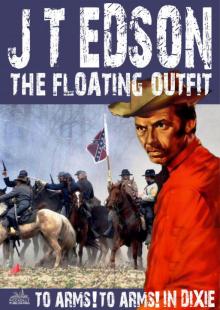 The Floating Outfit 34
The Floating Outfit 34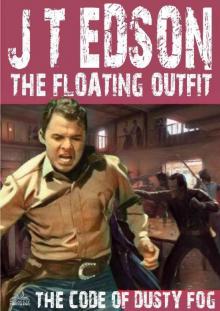 The Code of Dusty Fog
The Code of Dusty Fog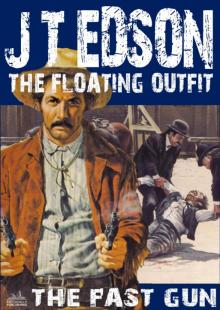 The Floating Outfit 21
The Floating Outfit 21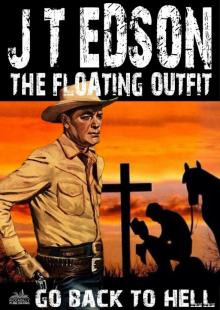 The Floating Outift 36
The Floating Outift 36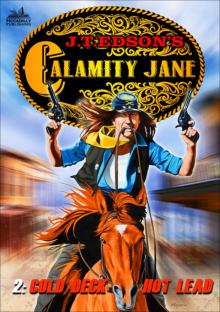 Calamity Jane 2
Calamity Jane 2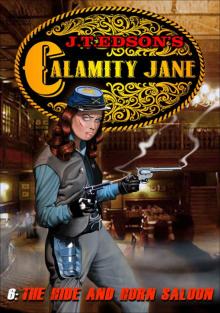 Calamity Jane 6: The Hide and Horn Saloon (A Calamity Jane Western)
Calamity Jane 6: The Hide and Horn Saloon (A Calamity Jane Western)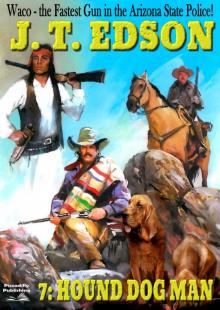 Waco 7
Waco 7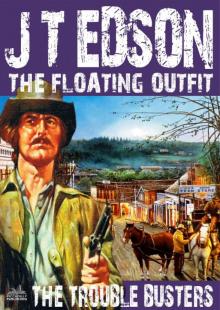 The Floating Outfit 25
The Floating Outfit 25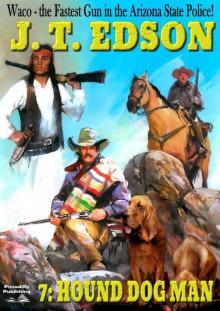 Waco 7: Hound Dog Man (A Waco Western)
Waco 7: Hound Dog Man (A Waco Western)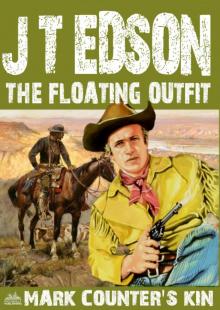 The Floating Outfit 47
The Floating Outfit 47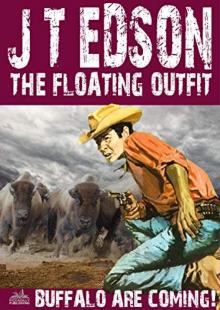 The Floating Outfit 42: Buffalo Are Coming!
The Floating Outfit 42: Buffalo Are Coming!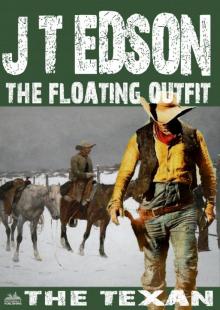 The Floating Outfit 46
The Floating Outfit 46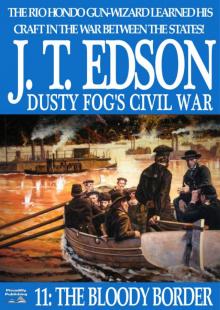 Dusty Fog's Civil War 11
Dusty Fog's Civil War 11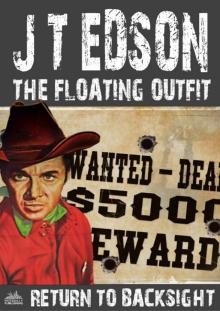 The Floating Outfit 61
The Floating Outfit 61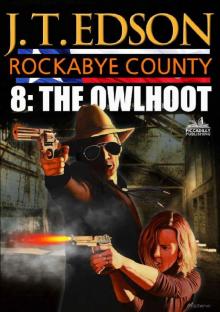 The Owlhoot
The Owlhoot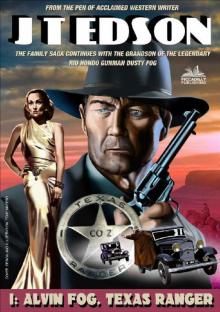 Alvin Fog, Texas Ranger
Alvin Fog, Texas Ranger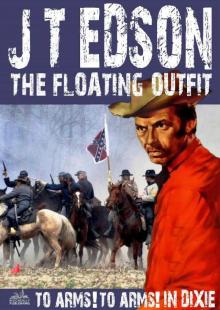 The Floating Outfit 34: To Arms! To Arms! In Dixie! (A Floating Outfit Western)
The Floating Outfit 34: To Arms! To Arms! In Dixie! (A Floating Outfit Western)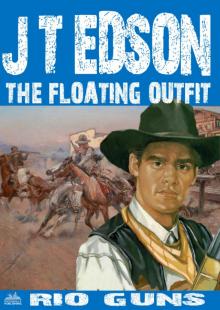 The Floating Outfit 44
The Floating Outfit 44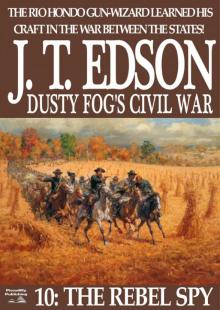 Dusty Fog's Civil War 10
Dusty Fog's Civil War 10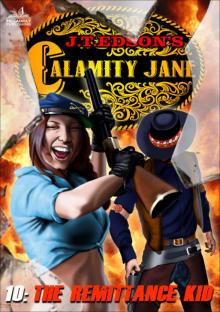 Calamity Jane 10
Calamity Jane 10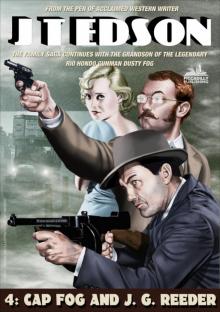 Cap Fog 4
Cap Fog 4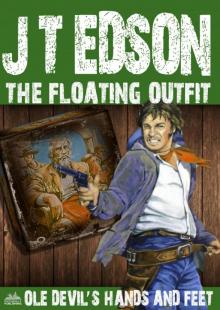 The Floating Outfit 51
The Floating Outfit 51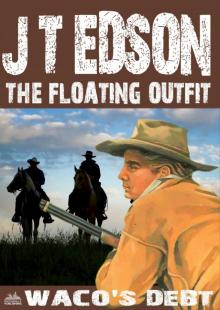 The Floating Outfit 50
The Floating Outfit 50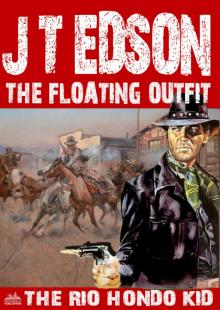 The Floating Outfit 49
The Floating Outfit 49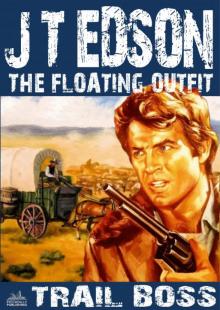 The Floating Outfit 10
The Floating Outfit 10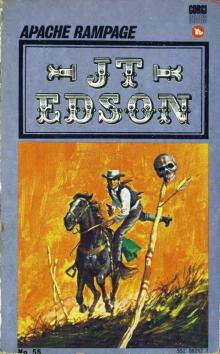 Apache Rampage
Apache Rampage The Floating Outfit 15
The Floating Outfit 15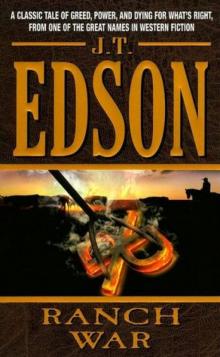 Ranch War
Ranch War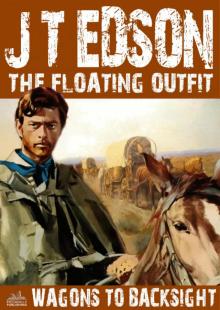 The Floating Outfit 11
The Floating Outfit 11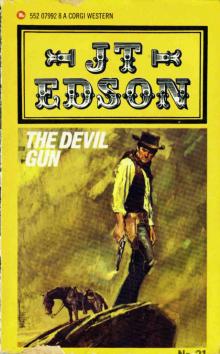 The Devil Gun
The Devil Gun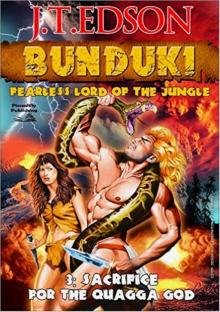 Sacrifice for the Quagga God (A Bunduki Jungle Adventure Book 3)
Sacrifice for the Quagga God (A Bunduki Jungle Adventure Book 3)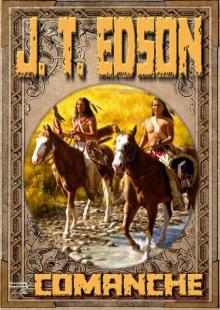 Comanche (A J.T. Edson Western Book 1)
Comanche (A J.T. Edson Western Book 1)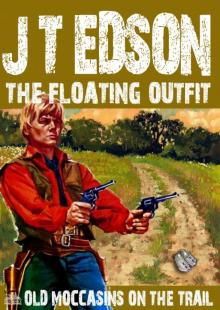 The Floating Outfit 48
The Floating Outfit 48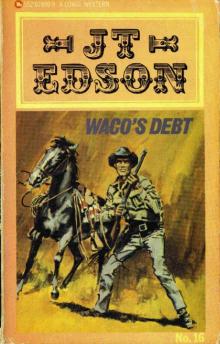 Wacos Debt
Wacos Debt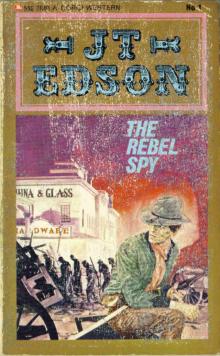 The Rebel Spy
The Rebel Spy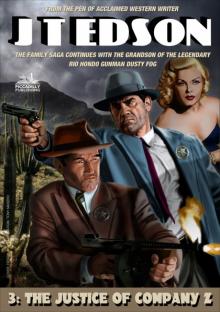 Cap Fog 3
Cap Fog 3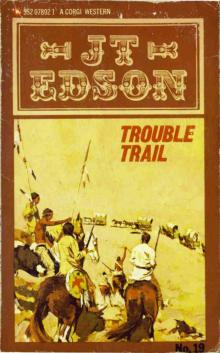 Trouble Trail
Trouble Trail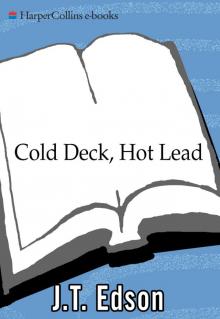 Cold Deck, Hot Lead
Cold Deck, Hot Lead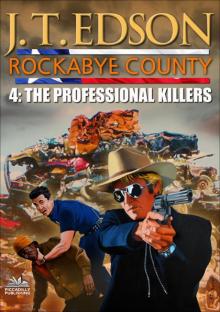 Rockabye County 4
Rockabye County 4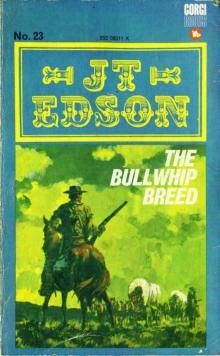 The Bullwhip Breed
The Bullwhip Breed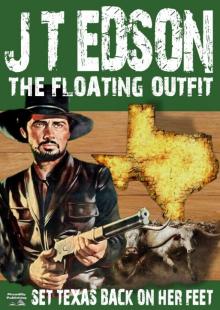 Set Texas Back On Her Feet (A Floating Outfit Western Book 6)
Set Texas Back On Her Feet (A Floating Outfit Western Book 6)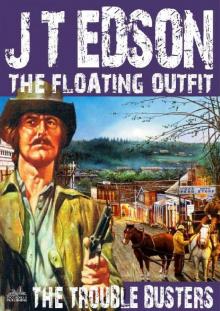 The Floating Outfit 25: The Trouble Busters (A Floating Outfit Western)
The Floating Outfit 25: The Trouble Busters (A Floating Outfit Western)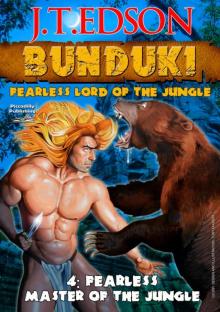 Fearless Master of the Jungle (A Bunduki Jungle Adventure
Fearless Master of the Jungle (A Bunduki Jungle Adventure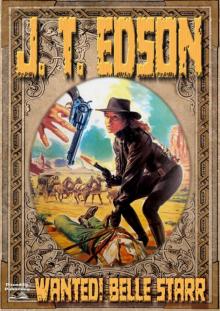 Wanted! Belle Starr!
Wanted! Belle Starr!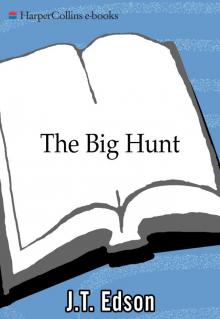 The Big Hunt
The Big Hunt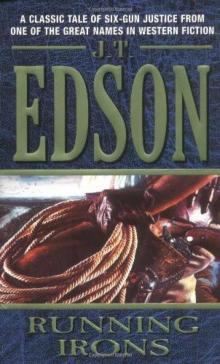 Running Irons
Running Irons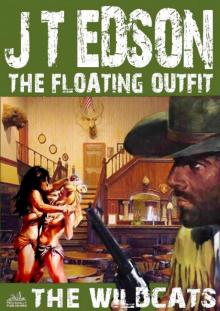 The Floating Outfit 19
The Floating Outfit 19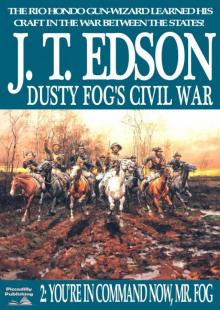 You're in Command Now, Mr Fog
You're in Command Now, Mr Fog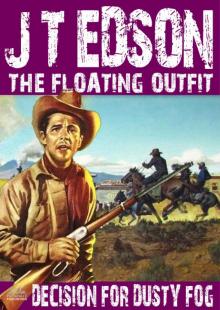 The Floating Outfit 27
The Floating Outfit 27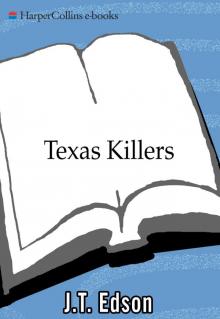 Texas Killers
Texas Killers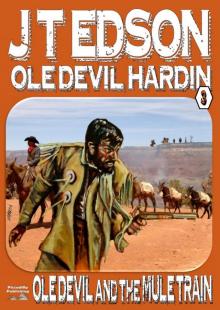 Ole Devil and the Mule Train (An Ole Devil Western Book 3)
Ole Devil and the Mule Train (An Ole Devil Western Book 3)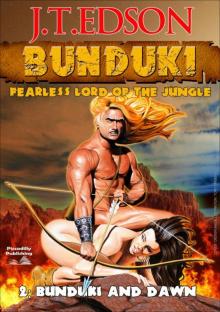 Bunduki and Dawn (A Bunduki Jungle Adventure Book 2)
Bunduki and Dawn (A Bunduki Jungle Adventure Book 2)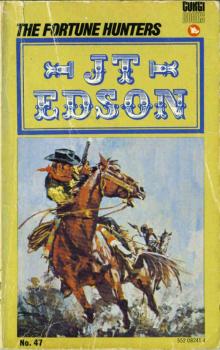 The Fortune Hunters
The Fortune Hunters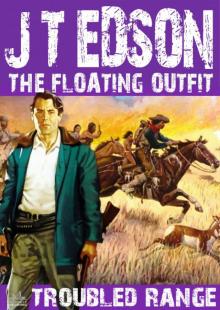 The Floating Outfit 12
The Floating Outfit 12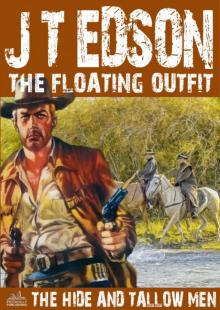 The Hide and Tallow Men (A Floating Outfit Western. Book 7)
The Hide and Tallow Men (A Floating Outfit Western. Book 7)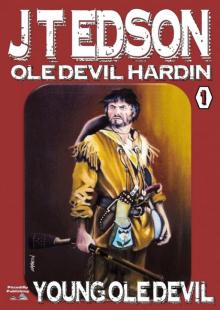 Young Ole Devil
Young Ole Devil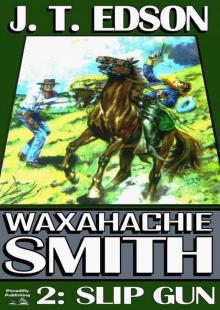 Slip Gun
Slip Gun The Drifter
The Drifter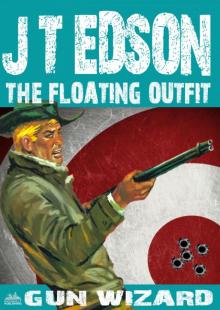 The Floating Outfit 45
The Floating Outfit 45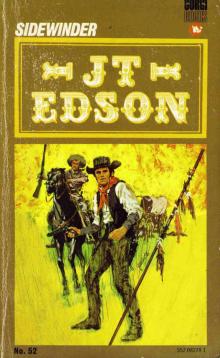 Sidewinder
Sidewinder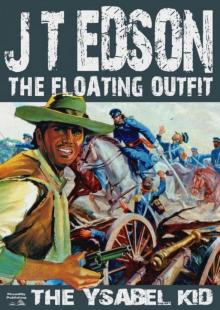 The Ysabel Kid
The Ysabel Kid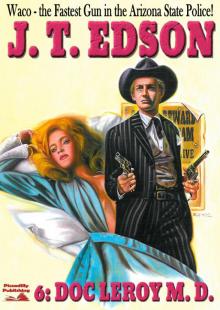 Waco 6
Waco 6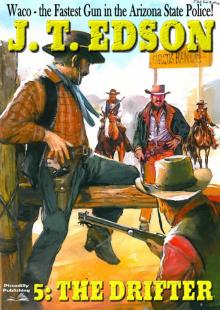 Waco 5
Waco 5 Point of Contact
Point of Contact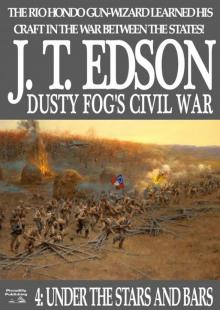 Under the Stars and Bars (A Dusty Fog Civil War Western Book 4)
Under the Stars and Bars (A Dusty Fog Civil War Western Book 4)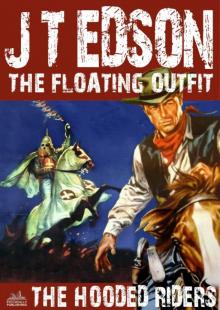 The Floating Outfit 9
The Floating Outfit 9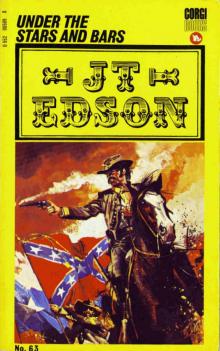 Under the Stars and Bars
Under the Stars and Bars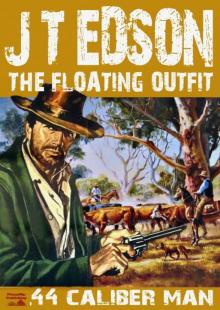 .44 Caliber Man
.44 Caliber Man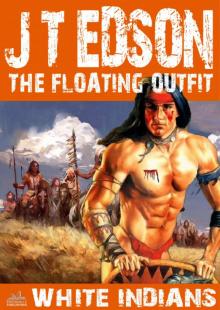 The Floating Outfit 17
The Floating Outfit 17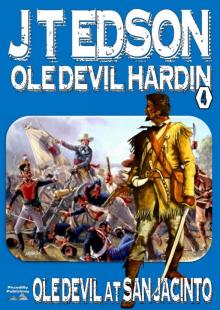 Ole Devil at San Jacinto (Old Devil Hardin Western Book 4)
Ole Devil at San Jacinto (Old Devil Hardin Western Book 4)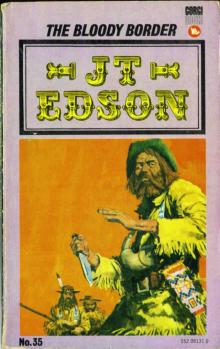 The Bloody Border
The Bloody Border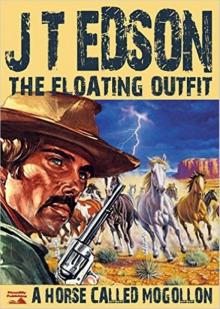 A Horse Called Mogollon (Floating Outfit Book 3)
A Horse Called Mogollon (Floating Outfit Book 3)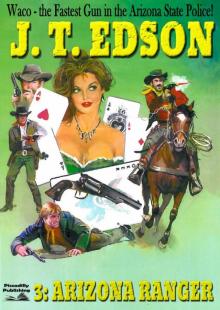 Waco 3
Waco 3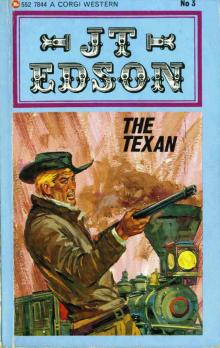 The Texan
The Texan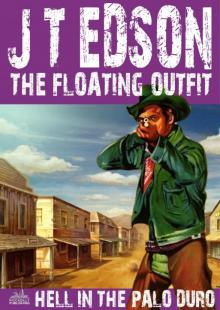 The Floating Outfit 35
The Floating Outfit 35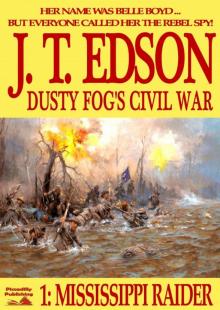 Mississippi Raider
Mississippi Raider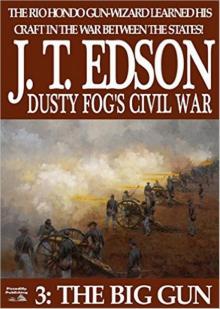 The Big Gun (Dusty Fog's Civil War Book 3)
The Big Gun (Dusty Fog's Civil War Book 3)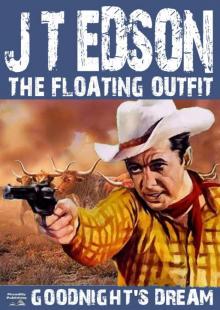 Goodnight's Dream (A Floating Outfit Western Book 4)
Goodnight's Dream (A Floating Outfit Western Book 4) Waco 4
Waco 4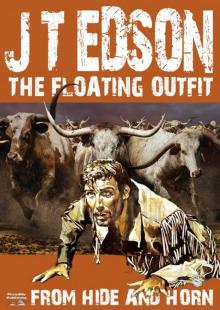 From Hide and Horn (A Floating Outfit Book Number 5)
From Hide and Horn (A Floating Outfit Book Number 5)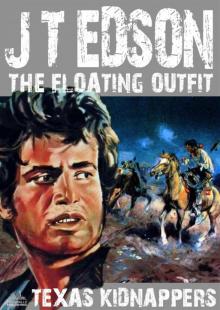 The Floating Outfit 18
The Floating Outfit 18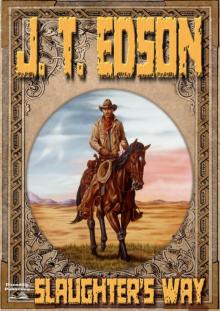 Slaughter's Way (A J.T. Edson Western)
Slaughter's Way (A J.T. Edson Western)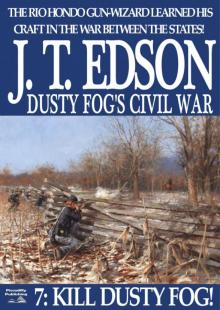 Dusty Fog's Civil War 7
Dusty Fog's Civil War 7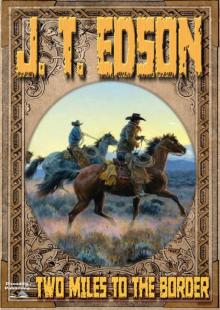 Two Miles to the Border (A J.T. Edson Western)
Two Miles to the Border (A J.T. Edson Western)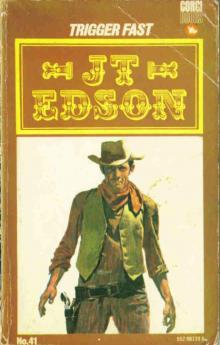 Trigger Fast
Trigger Fast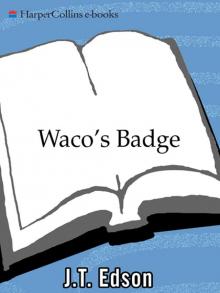 Waco's Badge
Waco's Badge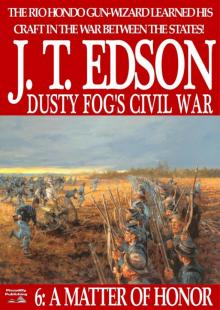 A Matter of Honor (Dusty Fog Civil War Book 6)
A Matter of Honor (Dusty Fog Civil War Book 6)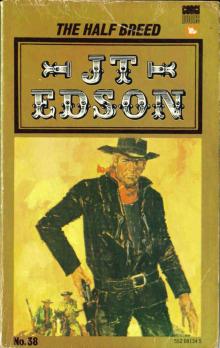 The Half Breed
The Half Breed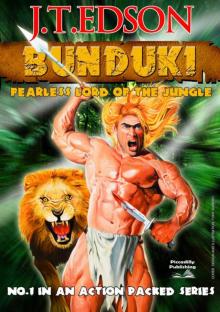 Bunduki (Bunduki Series Book One)
Bunduki (Bunduki Series Book One)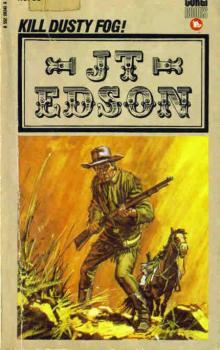 Kill Dusty Fog
Kill Dusty Fog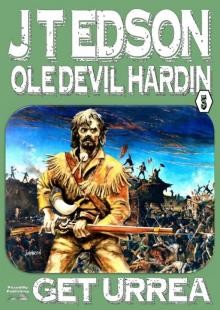 Get Urrea! (An Ole Devil Hardin Western Book 5)
Get Urrea! (An Ole Devil Hardin Western Book 5)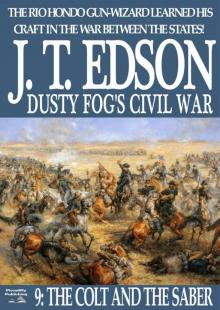 Dusty Fog's Civil War 9
Dusty Fog's Civil War 9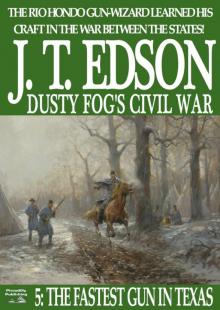 The Fastest Gun in Texas (A Dusty Fog Civil War Book 5)
The Fastest Gun in Texas (A Dusty Fog Civil War Book 5)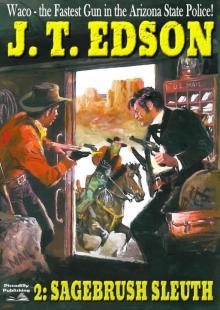 Sagebrush Sleuth (A Waco Western #2)
Sagebrush Sleuth (A Waco Western #2)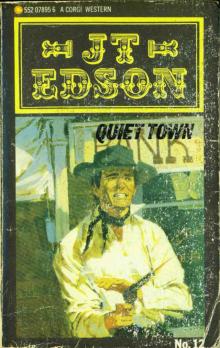 Quiet Town
Quiet Town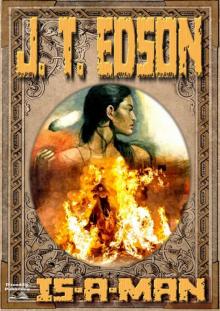 Is-A-Man (A J.T. Edson Standalone Western)
Is-A-Man (A J.T. Edson Standalone Western)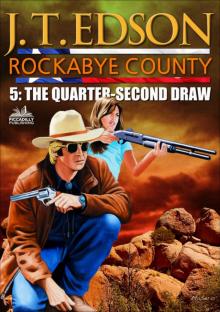 Rockabye County 5
Rockabye County 5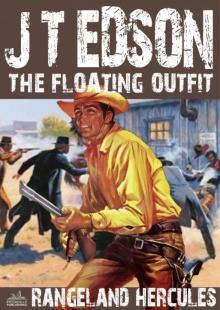 The Floating Outfit 14
The Floating Outfit 14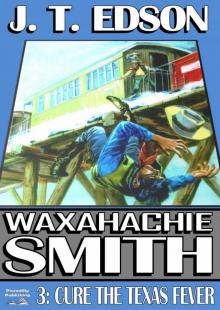 Cure the Texas Fever (A Waxahachie Smith Western--Book 3)
Cure the Texas Fever (A Waxahachie Smith Western--Book 3)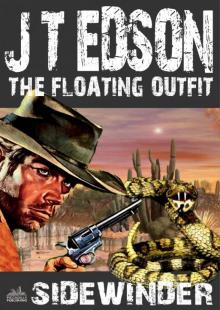 The Floating Outfit 13
The Floating Outfit 13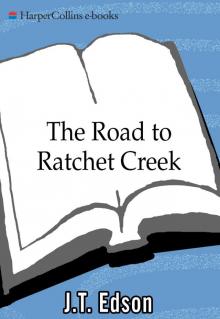 The Road to Ratchet Creek
The Road to Ratchet Creek